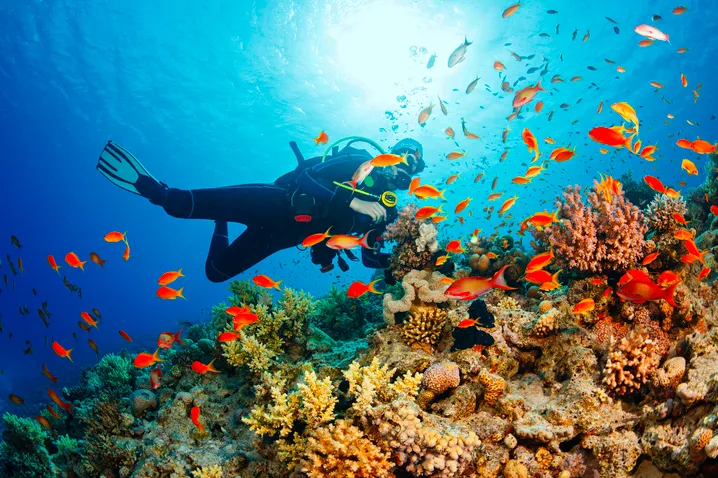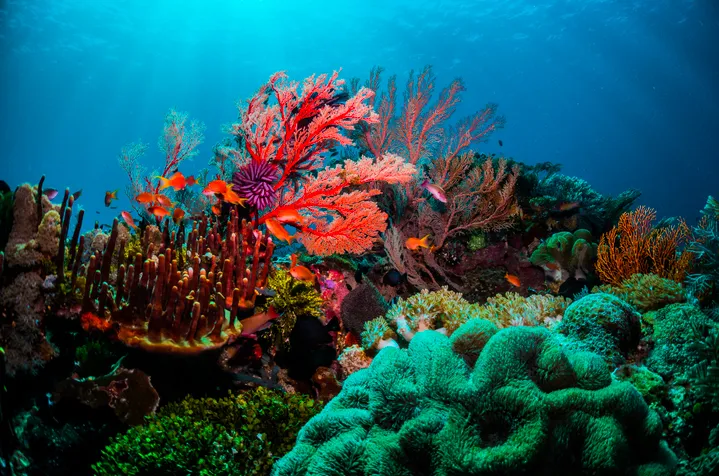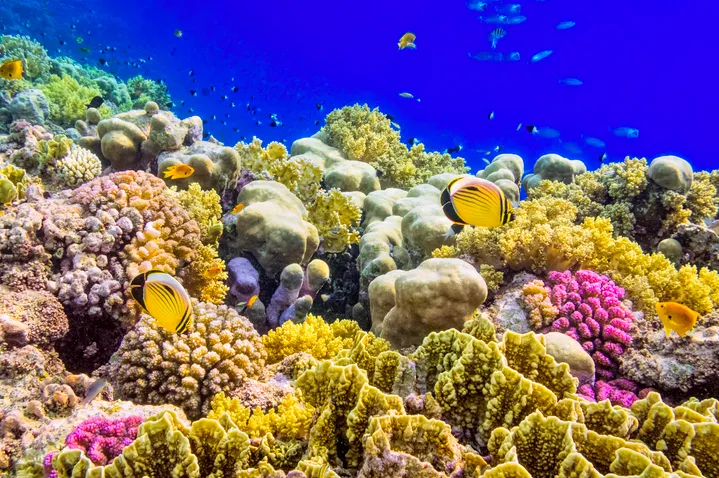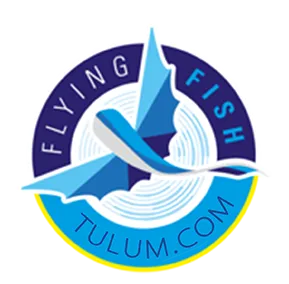January 28, 2024
CORAL REEF FUN FACTS - AND THE SAD REALITY!

Did you know that coral reefs are endangered?
‘Corals are particularly vulnerable to the effect of human activities including pollution, climate change, sedimentation and fishing.’

While scientists and climate change advocates continue to do the research and heavy lifting required to save our Coral Reefs
and the planet, we've decided to share some amazing facts about Corals, alongside the
small steps that we can take
within the dive community to help safeguard them from distress.
Amazing facts about Coral Reefs...
🐠 Corals are classified as diverse groups of invertebrate animals, and colonies of them join together over thousands of years to create a reef,
🐠 Some of the coral reefs on the planet began growing as far back as 50 million years ago,
🐠 Coral reefs cover less than 1% of the ocean floor and support 25% of all marine creatures — with over 25 coral species listed as threatened or endangered,
🐠 Coral reefs hold significant cultural value for coastal communities around the world — including indigenous communities in Australia and Hawaii,
🐠 Coral reefs play a valuable role in the defence from storms and flooding — reducing total wave height by an average 84% (essentially without them the annual damages from flooding would double),
🐠 An estimated 500 million people earn their livelihoods from the fishing stocks and tourism opportunities reefs provide, and
🐠 The tiny animals that give rise to reefs are offering hope for new drugs to treat cancer and other diseases.

Small steps that we can take within the dive community (and beyond)…
When it comes to protecting Coral Reefs, the process goes hand in hand with protecting the planet — with recycling and emission reduction at the top of the list!
Here’s a couple of things that you can do when diving/snorkeling near or around reefs (or if you're swimming in the oceans that house them) to ensure you’re not adding to the distress of Corals…
🤿 Avoid touching reefs or anchoring your boat on the reef when — this can damage delicate coral or even kill them.
🤿 Stop wearing sunscreen/sunblock in the ocean — because corals are not capable of moving, sediments can settle directly on top of them and smother them.
Remember these two simple rules when exploring Tulum’s Coral Reef, which is a part of the Mesoamerican Reef, the second largest in the world — stretching across Mexico, Belize, Guatemala and Honduras — and anywhere else you may be snorkeling, diving or swimming.
It's on us to do what we can to protect our beautiful oceans and all they offer us!

January 28, 2024
CORAL REEF FUN FACTS - AND THE SAD REALITY!
Did you know that coral reefs are endangered?
"Corals are particularly vulnerable to the effect of human activities including pollution, climate change, sedimentation and fishing."

While scientists and climate change advocates continue to do the research and heavy lifting required to save our Coral Reefs and the planet, we've decided to share some amazing facts about Corals, alongside the small steps that we can take within the dive community to help safeguard them from distress.
Amazing facts about Coral Reefs...
🐠 Corals are classified as diverse groups of invertebrate animals, and colonies of them join together over thousands of years to create a reef,
🐠 Some of the coral reefs on the planet began growing as far back as 50 million years ago,
🐠 Coral reefs cover less than 1% of the ocean floor and support 25% of all marine creatures — with over 25 coral species listed as threatened or endangered,
🐠 Coral reefs hold significant cultural value for coastal communities around the world — including indigenous communities in Australia and Hawaii,
🐠 Coral reefs play a valuable role in the defence from storms and flooding — reducing total wave height by an average 84% (essentially without them the annual damages from flooding would double),
🐠 An estimated 500 million people earn their livelihoods from the fishing stocks and tourism opportunities reefs provide, and
🐠 The tiny animals that give rise to reefs are offering hope for new drugs to treat cancer and other diseases.

Small steps that we can take within the dive community (and beyond)…
When it comes to protecting Coral Reefs, the process goes hand in hand with protecting the planet — with recycling and emission reduction at the top of the list!
Here’s a couple of things that you can do when diving/snorkeling near or around reefs (or if you're swimming in the oceans that house them) to ensure you’re not adding to the distress of Corals…
🤿 Avoid touching reefs or anchoring your boat on the reef when — this can damage delicate coral or even kill them.
🤿 Stop wearing sunscreen/sunblock in the ocean — because corals are not capable of moving, sediments can settle directly on top of them and smother them.
Remember these two simple rules when exploring Tulum’s Coral Reef, which is a part of the Mesoamerican Reef, the second largest in the world — stretching across Mexico, Belize, Guatemala and Honduras — and anywhere else you may be snorkeling, diving or swimming.
It's on us to do what we can to protect our beautiful oceans and all they offer us!
ADDITIONAL SOURCES FOR LEARNING MORE ABOUT CORAL REEFS:
https://www.nationalgeographic.com/science/article/scientists-work-to-save-coral-reefs-climate-change-marine-parks
*We source our imagery from the internet. If you we've used an image of yours and you'd like to be credited for it's use, please Contact Us and we'd be happy to do so. If you'd like us to take it down, also please let us know by messaging us directly.
ADDITIONAL SOURCES FOR LEARNING MORE ABOUT CORAL REEFS: https://www.nationalgeographic.com/science/article/scientists-work-to-save-coral-reefs-climate-change-marine-parks
*We source our imagery from the internet. If you we've used an image of yours and you'd like to be credited for it's use, please Contact Us and we'd be happy to do so. If you'd like us to take it down, also please let us know by messaging us directly.

FLYING FISH TULUM
Calle Polar Pte
entre Calle Beta Norte y Orion Nte Tulum Centro
77760
Flying Fish Tulum Dive Shop is a Scuba Diving, Snorkel and Bike Rental shop located in the heart of Tulum. CONTACT US today or connect with us on IG to stay up to date with what we have to offer.




